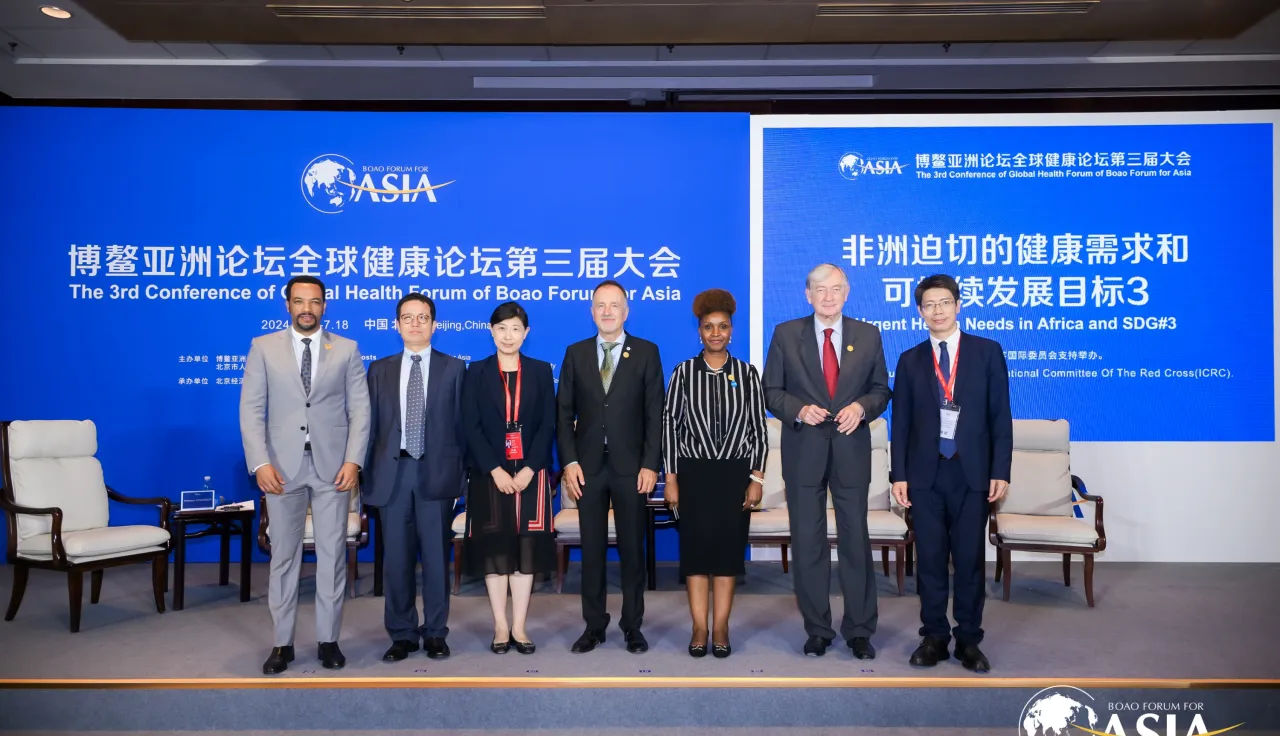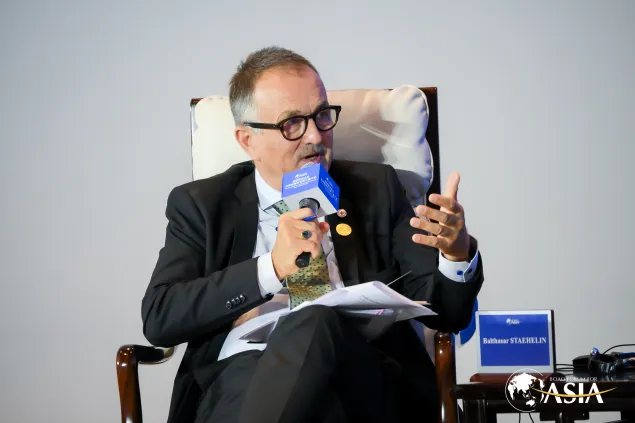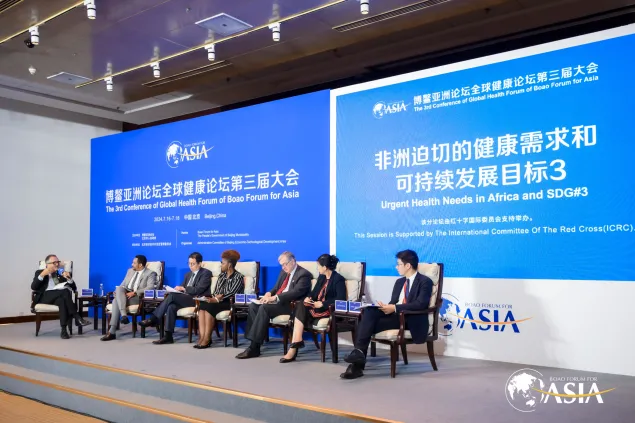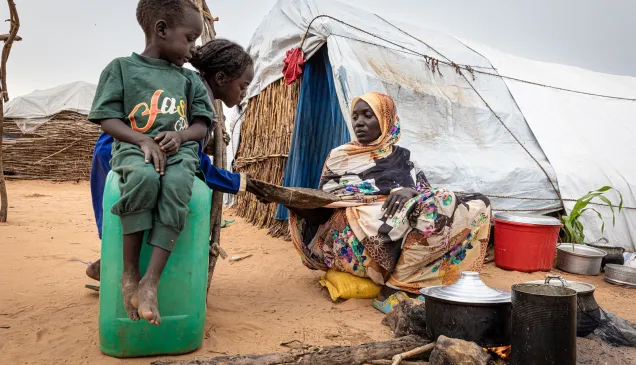Working together to address Africa’s health challenges and to achieve sustainable development goals (SDGs)

On July 16, the 3rd Conference of Global Health Forum of Boao Forum for Asia was held in Beijing. The ICRC held a session on “Urgent Health Needs in Africa and SDG#3.”
Moderated by Mr. Balthasar Staehelin, Personal Envoy of the ICRC President to China and Head of the Regional Delegation for East Asia, this session was joined by esteemed speakers including Dr. Dereje Duguma Gemeda, State Minister for Health Services and Program Wing of the Federal Democratic Republic of Ethiopia, Dr. Gan Ge, Deputy Director of China National Health Development Research Center, Ms. Amakobe Sande, UNICEF Representative to China, Mr. Danilo Türk, former President of Slovenia, Dr. Qi Xiaopeng, Director of Center for Global Public Health of Chinese Center for Disease Control and Prevention (China CDC), and Dr. Zhou Taidong, Vice Dean of Center for International Knowledge on Development (CIKD) for in-depth discussions regarding strengthening healthcare infrastructure in vulnerable communities in Africa, capacity building, improving outcome evaluation, and the building of an equitable and transparent aid system.
Sustainable Development Goal (SDG)#3, one of the 17 SDGs of the UN 2030 Sustainable Development Agenda, focuses on ensuring healthy lives and promoting well-being for all at all ages. Through innovative solutions, community resilience, and international cooperation, many African nations have achieved significant progress in improving health indicators, said Staehelin.
“However, due to fragmented health systems, frequent natural disasters and armed conflicts, and persistent socioeconomic problems, Africa's path to achieving the SDG#3 faces headwinds.”

“Climate change has increased the spread of infectious diseases and exacerbated tropical diseases such as malaria, cholera and dengue fever,” Dr. Dereje Duguma Gemeda, State Minister for Health Services and Program Wing of the Federal Democratic Republic of Ethiopia, spoke of public health issues faced by Ethiopia in the post-pandemic era, “Armed conflicts in the north, among other serious problems, have displaced millions of people including staff at healthcare facilities, disrupting the normal operation of hospitals and clinics.” Dr. Duguma said that Ethiopia is proactively incorporating healthcare indicators into policymaking towards better resource allocation, adding that global cooperation and international solidarity are key to supporting Africa.
Ms. Amakobe Sande, UNICEF Representative to China, shared remarkable progress achieved in public health by African states such as reducing child mortality rate, and she also pointed out that compromised investment for children and high debt have resulted in uneven healthcare development.
“Challenges faced by Africa are also global challenges, and addressing Africa’s problems requires the world to join hands to collaboratively devise strategies and build defenses”, said Dr. Gan Ge, Deputy Director of China National Health Development Research Center. He underlined that Africa’s health system is highly vulnerable; the continent accounts for 18% of the world population but carries 25% of the world’s disease burden, and only 3% of the global health workers are based in Africa. In light of this, he made specific suggestions on assistance to Africa by the international community: “The first is to prioritize investment in human resources for health, strengthen international exchanges of health workers, and enhance the professional competencies of health workers in Africa. The second is to increase support for local production of medical products in Africa. Through technical support and technology transfer, the international community will enhance Africa’s capacity for independent production and technological innovation. The third is to facilitate digital transformation of health systems.”

Stronger international cooperation and empowered advancement in local health sector will lay a solid foundation for reaching SDG #3 in the African Continent. Panelists offered diverse perspectives on how to achieve this goal through multilateral cooperation mechanisms such as South-South Cooperation and the United Nations.
Mr. Danilo Türk, a Board Member of the Boao Forum for Asia and the former President of Slovenia, acknowledged the value of cooperation mechanisms, citing the African Union’s enhanced capabilities from responding to Ebola to combating Covid-19 as examples. He underlined that health matters are not solely the responsibility of the health department and cannot be tackled by any single country alone. He also pointed out the imperative for health needs to be taken into account in policymaking and prioritized for global financing.
Dr. Qi Xiaopeng, Director of the Center for Global Public Health at China CDC, introduced three key principles for global health collaboration based on China's experience in health aid programs in Africa: a holistic approach, universal connection, and innovation. She brought attention to the cross-disciplinary nature of health aid programs, underscoring the importance of innovative solutions as demonstrated by Mozambique's efforts in malaria prevention and control. She mentioned that “northern Mozambique is heavily affected by malaria, with an incident rate exceeding 50%, which is significantly higher than the mere 1% in the South. This is due to the different local climate conditions, population behaviors, and levels of vaccines inoculation and drug resistance. It is crucial, therefore, to develop data-driven tools that can be tailored to the needs of different regions. Currently, Mozambique, Kenya, Nigeria, and Tanzania are all designing programs that are backed by data and customized to their specific needs.”
Dr. Zhou Taidong, Vice Dean at the CIKD, shared his insight on how international organizations like the ICRC and UNICEF can have a greater impact on improving healthcare in Africa. He noted that these organizations enjoy a wealth of experience from their longstanding efforts in providing assistance to Africa. Their solid international reputation and extensive partnership networks could serve to mobilize more partners to work together in finding solutions. Dr. Zhou stated that “vaccines are a key component of China's Global Development Initiative. I believe that multilateral organizations can play a more prominent role in implementing this Initiative and enhancing positive China-Africa cooperation in healthcare.”
The panelists also delved into various topics, including ways to train professionals in Africa, promoting full coverage of basic healthcare at the community level, incorporating health priorities into all aspects of policymaking, and establishing transparent and efficient project evaluation mechanisms.
Mr. Staehelin underscored the importance of including everyone, especially the vulnerable populations living in areas affected by armed conflicts and violence (comprising over 25% of world population), in discussions on advancing sustainable development goals. He emphasized “the need to ensure a more equitable distribution of global health and humanitarian resources, bridging the gap for the African people, particularly those affected by conflicts, including the 83 million Africans living in areas controlled by armed groups. ”
“As a neutral humanitarian organization, the ICRC is uniquely placed with extensive experience in operating in fragile situations, especially in accessing remote areas controlled by non-state armed groups to address the pressing health needs of the local population.”
The ICRC Annual Report 2023 indicates that 38% of its annual budget was spent in Africa, including supporting nearly 300 hospitals and about 350 health centers.
Photos: Boao Forum for Asia



